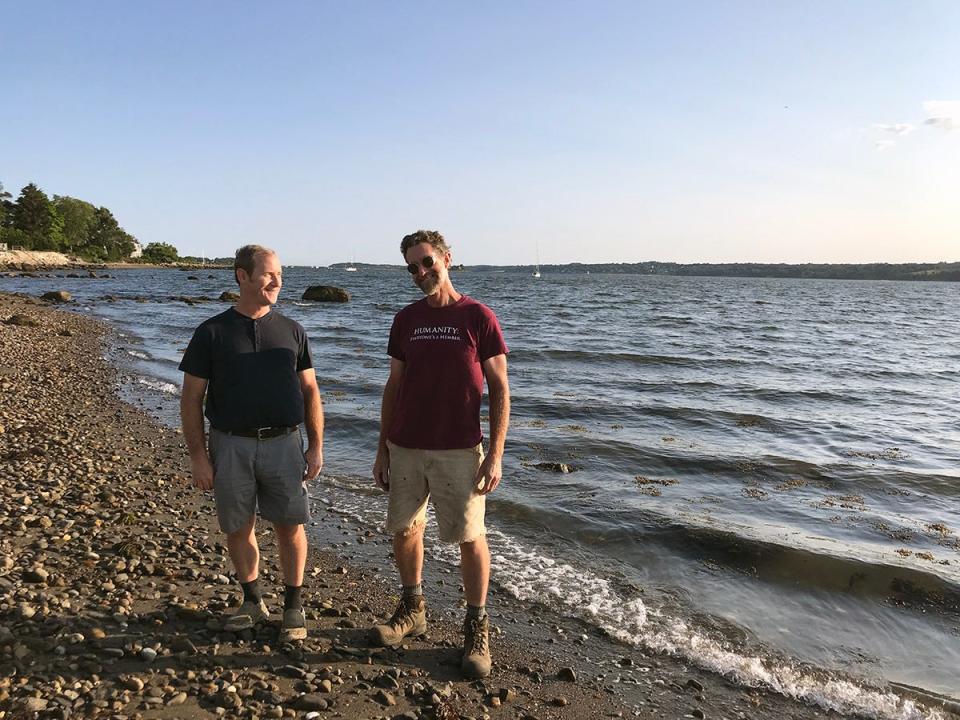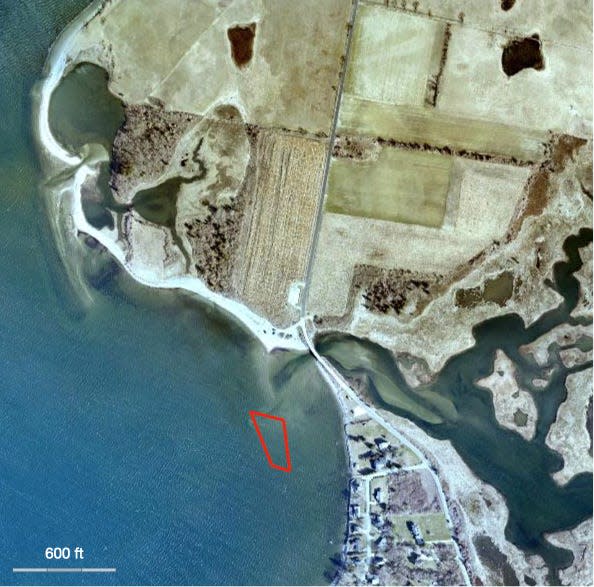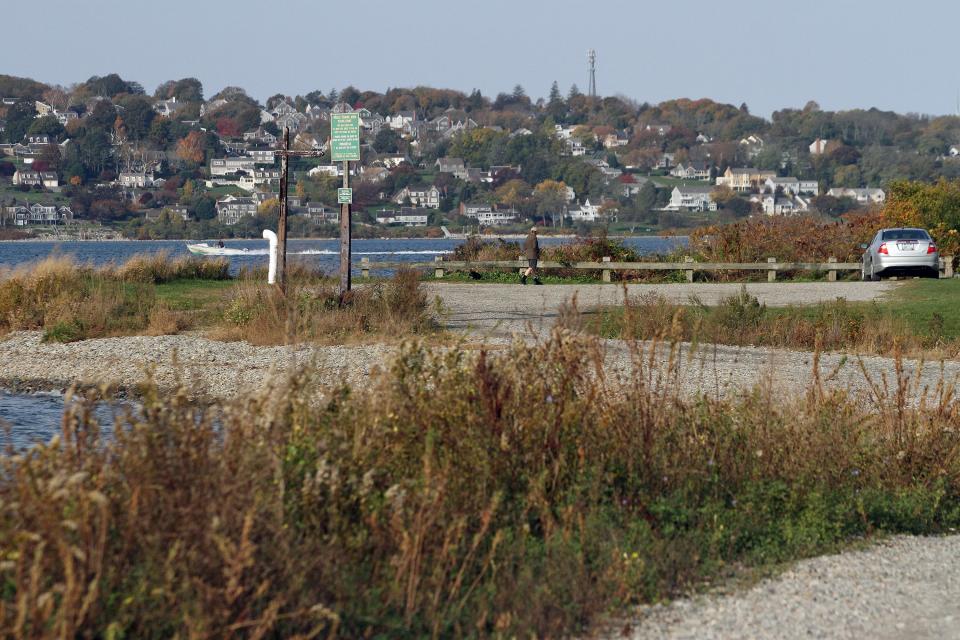Where can oyster farms be located in RI? Proposed restrictions reopen debate in Tiverton
- Oops!Something went wrong.Please try again later.
A bill before the General Assembly aims to end the battle over a proposed oyster farm in Tiverton by effectively rendering Sapowet Cove off-limits for new aquaculture leases.
Introduced by Rep. John Edwards, D-Tiverton, H 5037 would create a two-year pilot program in which any new oyster farms on the Sakonnet River would need to be least 1,000 feet from shore. It would not affect oyster farms already in operation.
It would, however, affect John and Patrick Bowen, who hope to establish an oyster farm in sheltered Sapowet Cove and have faced massive resistance from neighbors.
"If we could somehow make just this area go away, I’d have no problem with that," Edwards told the House Environment and Natural Resources Committee on Thursday. He said he'd be open to rethinking the wording of the bill to achieve that same goal — for instance, by restricting new oyster farms north of Fogland Point.
Oyster wars:Why RI homeowners are fighting to keep shellfish farms out of their backyards
"It’s not a resident of our town. ... It’s not like it’s a Tivertonian coming into get licensed," Edwards said of the Bowen brothers, who are fourth-generation residents of Little Compton. "This is people from out of town. And they do not seem to have the same respect for the area."
A few committee members expressed reservations on Thursday, citing the benefits of oyster farms.
"These are a great thing for the environment," said Rep. Kathleen Fogarty, D-South Kingstown. "It’s a boon for the economy, and these oysters, scallops and bivalves are cleaning the water here in Rhode Island. So I think it's a very positive business."
Opponents say bill would amount to a moratorium on any new farms
The Bowen brothers previously told The Providence Journal that they chose a site close to shore because they're hoping to make their business carbon-neutral, so they would like to wade out to their cages at low tide rather than using a skiff.

Establishing a 1,000-foot buffer zone will only create problems, the owners of existing oyster farms on the Sakonnet River said Thursday.
Pushing new oyster farms away from shore "will move them into higher areas of boat traffic, creating more user conflict," testified Matthew Griffin, the owner of Saltbox Sea Farm.
Dan Torre, the owner of Aquidneck Island Oyster Company, said the bill would "effectively lead to a moratorium" on new farms because sites that far offshore would be rejected on the grounds that they present a hazard to navigation.
Oyster farms currently take up "less than one half of one percent of state waters," Griffin said.
Under state regulations, they can't be located on productive quahogging or commercial fishing grounds, on eelgrass beds, or in shipping channels. The upper portion of Narragansett Bay is too polluted to grow oysters, but too far south there aren't enough nutrients in the water.
Growers also seek out sheltered areas where their gear won't be damaged by wind and waves. Throughout the state, they've encountered resistance from nearby homeowners.
More:Matunuck Oyster Bar wants to expand its farm. The permit may be denied because of water-skiing
"Having oyster farms close to shore diminishes property values and lowers the desirability of the area for residents and tourists that travel here for water activities," Patricia Garber of Tiverton wrote in support of the bill, noting that "landowners have paid handsomely for property along the Sakonnet and continue to pay large property taxes annually."
Debate over proposed oyster farm has lasted for years
Supporters of the bill say the Bowen brothers' proposed oyster farm would interfere with recreational activities like fishing and boating. They note that it would be situated near the state-owned Sapowet Marsh Wildlife Management Area, which has a small beach and does not charge for parking.
"Objections to the location are not a contest between poor local farmers versus rich out-of-town landowners, although some would have us believe that," testified Kenneth Mendez, who previously told The Journal that he chose to purchase a second home near Sapowet Cove because it was an excellent fishing spot. "This is about protecting a unique marine environment which is unspoiled, safe, shallow and highly used by the general public."
The Bowens have countered that their farm would take up slightly less than an acre, and leave most of the cove open for recreational activities.

"You can still use that beach, you can still use that parking lot," testified Katie Martin of the Ocean State Shellfish Cooperative, which opposes the bill. "The oyster farm there doesn’t preclude people from using that shoreline altogether."
The Bowens have been waiting three years for the Coastal Resources Management Council to make a decision about their application. Theirs is the only pending application that would be affected by the bill.
Rep. Barbara Ann Fenton-Fung, R-Cranston, expressed concerns about the long wait and asked whether the CRMC's existing permitting process needed to be streamlined.
"Sometimes we make it so difficult that business owners are like, 'We’re going to Massachusetts,'" she said.

Battle ground:How an unlikely group of neighbors in Warwick are fighting to keep a walking trail open to the public.
Concerns about a slippery slope of legislative restrictions
Edwards' bill is a trimmed-down version of legislation he introduced last year, which would have applied statewide.
Although it now only applies to the Sakonnet River, Rep. Carol Hagan McEntee, D-Narragansett, said that people in her district were concerned that attempts to place additional restrictions on oyster farms wouldn't stop there.
Fogarty observed that Matunuck Oyster Bar is facing similar pushback. She said that the complaints came from people from New York and Connecticut who "were upset about their water view being ruined."
"I thought to myself, you’re not here in the wintertime," she said. "And I don't really care, quite honestly, because this is such a boon to our economy."
The committee voted to hold the bill for further study, as is typical at initial hearings.
Some members suggested that the General Assembly should take a broader look at how the CRMC handles aquaculture applications. Rep. Michelle McGaw, D-Portsmouth, said she'd prefer that to "blanket legislation that, unfortunately, would not take into consideration the many factors associated with each application."
"I want to create a process that works for everyone," McGaw said.
"It is a booming business. Definitely, we have to keep some restraints on it; it can’t take over all the shoreline. But we have to be cognizant of the fact that this is an industry that is growing," McEntee said. "None of this is going to go away. We’ve just got to figure out how to do it right and incorporate everyone’s interests."
This article originally appeared on The Providence Journal: Proposed aquaculture restrictions in Tiverton renew oyster farm debate

